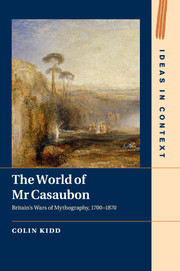Book contents
- Frontmatter
- Contents
- Acknowledgements
- 1 Prologue: Casaubon's Dubious Bequest
- 2 The Key to All Mythologies
- 3 The Legacies of the Ancients in Enlightenment Mythography
- 4 The Obsessions of Jacob Bryant: Arkite Idolatry and the Quest for Troy
- 5 The Dispute of the Orient: Anglo-French Rivalries in an Age of Revolution
- 6 Fish-gods, Floods and Serpent-worship: From Apologetics to Anthropology
- 7 Epilogue: The Keys to All Mythology in 1872
- Index
- Miscellaneous Endmatter
2 - The Key to All Mythologies
Published online by Cambridge University Press: 24 November 2016
- Frontmatter
- Contents
- Acknowledgements
- 1 Prologue: Casaubon's Dubious Bequest
- 2 The Key to All Mythologies
- 3 The Legacies of the Ancients in Enlightenment Mythography
- 4 The Obsessions of Jacob Bryant: Arkite Idolatry and the Quest for Troy
- 5 The Dispute of the Orient: Anglo-French Rivalries in an Age of Revolution
- 6 Fish-gods, Floods and Serpent-worship: From Apologetics to Anthropology
- 7 Epilogue: The Keys to All Mythology in 1872
- Index
- Miscellaneous Endmatter
Summary
[H]e had undertaken to show (what indeed had been attempted before, but not with that thoroughness, justice of comparison, and effectiveness of arrangement at which Mr Casaubon aimed) that all the mythical systems or erratic mythical fragments in the world were corruptions of a tradition originally revealed.
(Middlemarch, ch. 3)The ‘Key to All Mythologies’ has become a byword for the mind-numbingly recondite and is typically thought of as a scene of arid and misguided pedantry. Readers of Middlemarch also gain a sense of the windy and unfocused emptiness of Casaubon's project, its seemingly unrealisable immensity bringing into relief the mythographer's pettiness. Casaubon did, of course, pay attention to detail – an excessive antiquarian attention to trifles indeed; but the logic of his bloated project led him to superimpose a universal pattern on immensely varied elements, regardless of their context or provenance. Mr Casaubon, readers soon divine, had bitten off more than he could chew.
Casaubon seems in that respect like one of the other central characters in Middlemarch, Dr Tertius Lydgate, who is engaged on a medical quest to unravel the scientific secrets of the most basic building block of life, what he calls ‘primitive tissue’. The supposed parallel here is obvious, for Lydgate, whose vainglorious dreams and ambitions exceed his grasp, is, under the influence of the French anatomist Marie-François Xavier Bichat (1771–1802), attempting to discover what might be called a key to all biology. Indeed, Lydgate, like Casaubon who desperately tries to reduce all myths to a common cipher, has a totalising and reductive approach to knowledge and is keen to unravel ‘the homogeneous origin of all the tissues’. Yet in both cases there are more generous ways of assessing each man's pretensions to learning, though Eliot, it seems, only grants such indulgence to Lydgate (who, to be fair, was also inspired – unlike the quietly misanthropic Casaubon – by philanthropic intentions to improve the lot of his fellow humans). As Eliot and her readers knew, Lydgate was onto something, and the knowing reader appreciates that despite being a young man in a hurry Lydgate was an unsung pioneer in the development of cell theory by Matthias Schleiden (1804–81) and Theodor Schwann (1810–82). The road, which for Lydgate proved to be a cul-de-sac, turned out to be a throughway. Sympathetic understanding of this sort is not extended to Casaubon or to his enterprise.
- Type
- Chapter
- Information
- The World of Mr CasaubonBritain's Wars of Mythography, 1700–1870, pp. 29 - 78Publisher: Cambridge University PressPrint publication year: 2016

